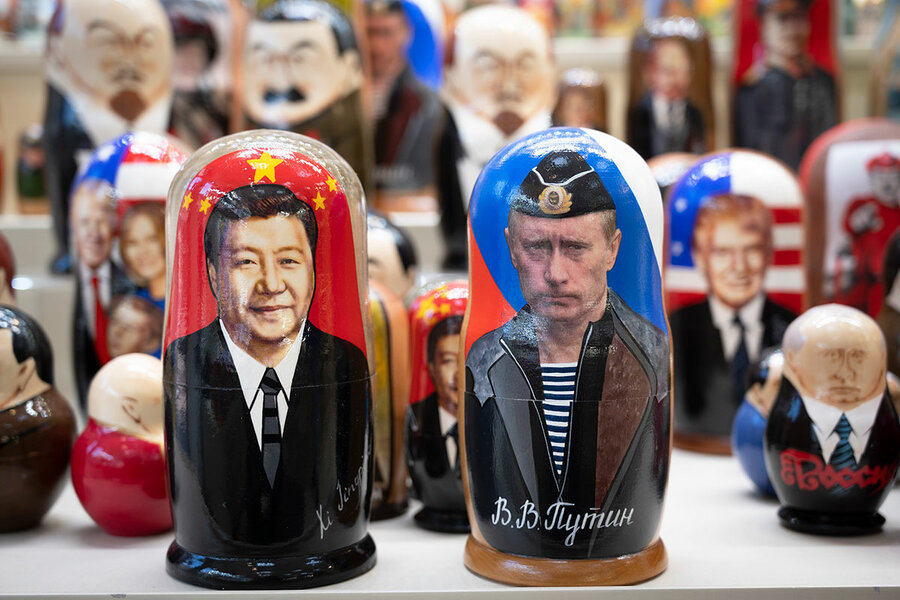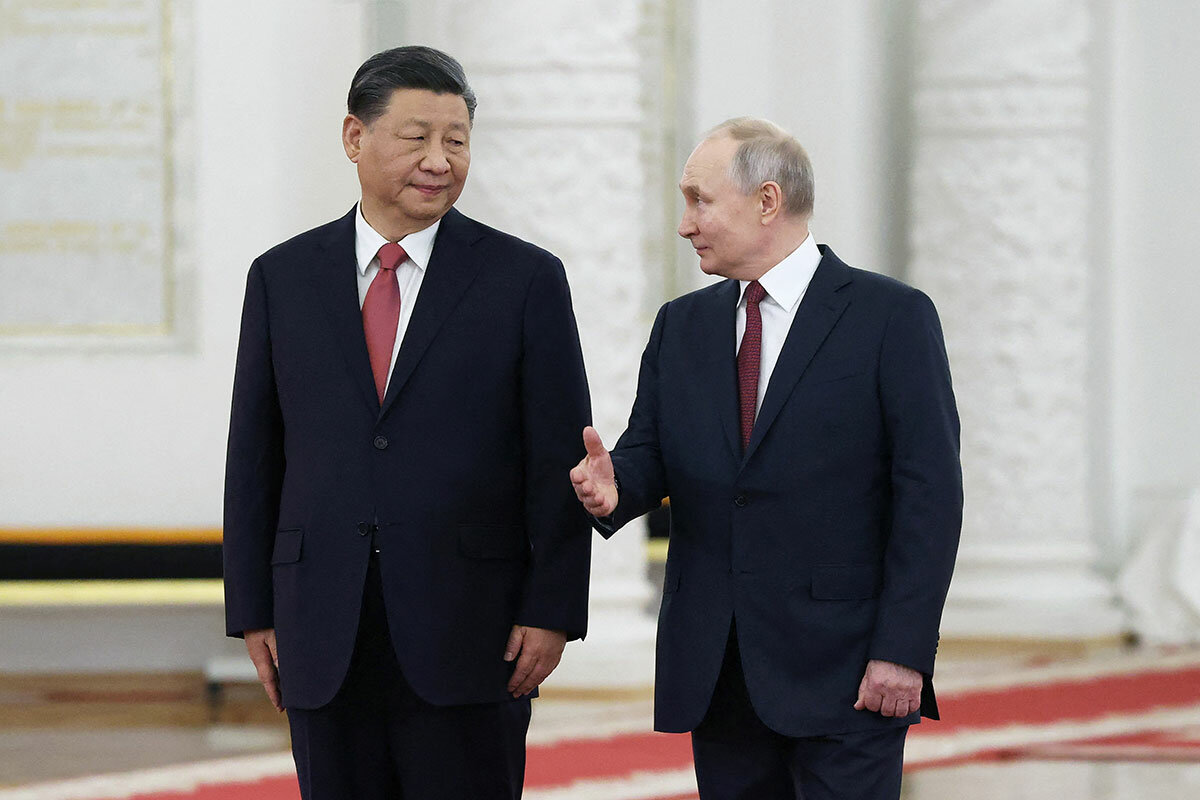Has war in Ukraine sealed the bond between Russia and China?
Loading...
| Moscow
When Chinese leader Xi Jinping arrived in Moscow on Monday for a three-day summit with Russian President Vladimir Putin, one of the most talked about items on their agenda was a Chinese-mediated settlement for the war in Ukraine.
As Mr. Xi’s plane departed on Wednesday, though prospects were discussed and Mr. Putin lauded a 12-point Chinese list of principles for establishing peace, no specific progress publicly emerged.
But what did become clear is that the intense geopolitical pressures triggered by the war have driven Russia and China closer together.
Why We Wrote This
A story focused onXi Jinping and Vladimir Putin’s summit in Moscow was nominally meant to be about bringing peace to Ukraine. But it appears to have strengthened the countries’ partnership against the West.
The two leaders spent hours in closed, personal talks and signed a raft of new agreements aimed at cementing a strategic partnership that has been tightening for years. The deals included stepped-up military coordination, expanded trade, a “nearly finalized” compact to build a major new gas pipeline that would permanently divert Russian gas supplies from Europe to China, and more concerted efforts to remove the U.S. dollar from their mutual economic transactions.
Whether or not China plays peacemaker – which Russian commentators say is not likely to be a possibility until after further developments occur on the battlefield – a potentially more important byproduct of the war in Ukraine is to cement Russo-Chinese bonds. The two countries’ burgeoning relationship is mostly driven by their mutual alienation from the West – and from the United States in particular – and by the need to have each other’s back if the East-West confrontation escalates.
“The really new thing here is that the Chinese appear to have concluded that their relations with the U.S. are headed for full confrontation, if not conflict. That was not obvious even at the beginning of the Biden administration, but now it is. Things are getting worse and worse,” says Dmitry Suslov, a professor at the Higher School of Economics in Moscow. “The understanding has dawned that the Russia-China partnership makes each stronger vis-à-vis the U.S., that consolidating this partnership is an existential issue for both.”
“China as a truly global player”
Last month, the Chinese Foreign Ministry published a hefty indictment of “US Hegemony and its Perils,” which spells out a list of historical grievances and a manifesto for a new multipolar world order that dovetails very neatly with the Kremlin’s thinking.
“Hence, the economic and strategic partnership [that Mr. Xi and Mr. Putin] are forging is not merely mutually beneficial,” Mr. Suslov says. “In every area, from agriculture to finance, we see that China and Russia are pledging to supply each other with the critical resources necessary for survival. Even if we should find ourselves in a situation of complete economic blockade, we will be able to help each other deal with the challenges.”
Another new factor is that any uncertainty about who will be leading China for the foreseeable future has been dispelled with Mr. Xi’s reelection to an unprecedented third term as leader. Mr. Xi, in turn, took the extraordinary step of telling Mr. Putin publicly that he believes the Russian people will support Mr. Putin in upcoming 2024 presidential polls. The signal, Russian analysts say, is that these two leaders expect to be around for quite awhile, and are prepared to hatch serious long-range strategic plans.
“There is a whole new level to the relationship,” says Andrey Klimov, deputy head of the International Affairs Committee of the Federation Council, Russia’s upper house of parliament. “Xi is now really leader of China, and not just another general-secretary. He is ready to build a long-term strategic partnership; we are no longer talking just about the near horizon.”
Analysts say China is increasingly worried that most of its trade with the outside world passes through the Strait of Malacca, which could theoretically be cut in any conflict by the U.S. Navy. Next door Russia, with whom China shares a 2,600-mile border, is a veritable cornucopia of raw materials, energy, and undeveloped arable land. Its rail network also offers a potential link to Europe, while the Northern Sea Route over the top of Russia potentially offers a U.S. Navy-free path to the Atlantic Ocean for Chinese shipping. Russian analysts say it’s no coincidence that most of those areas, including joint development of the Arctic shipping route, were the subjects of intense discussion and many of the agreements signed during the talks.
Andrey Kortunov, academic director of the Russian International Affairs Council, which is affiliated with the Foreign Ministry, says that the consolidation of relations with Russia is a part of a broader Chinese outreach to the world, which is moving beyond the economics-led approach embodied in the Belt and Road Initiative.
“We see the Chinese becoming more active in Africa and Latin America. The so-called Chinese peace plan for Ukraine is part of this much bigger effort to position China as a truly global player, second to none,” he says. “Many people in the Global South are looking for new arrangements, and the principles outlined in that Chinese plan are broadly applicable, not just about Ukraine, but about the way the Chinese think the world should be run.”
Playing the long game
The Chinese and Russian leaders reportedly spent quite a while discussing the conflict in Ukraine, but had little of substance to say about it in their lengthy final statement.
“China would prefer to empathize with Russia in its standoff with the West, rather than openly support it in the conflict with Ukraine,” says Mr. Kortunov. “China does hope, down the road, to position itself to mediate in the war. That requires maintaining good relations with Kyiv. It should be remembered that China has big investments in Ukraine, has been a major trading partner, and would obviously also want to be a major player in any reconstruction efforts,” he says.
At the same time, there was no mention of last week’s arrest warrant for Mr. Putin, issued by the International Criminal Court, in the public record of Mr. Xi and Mr. Putin’s meetings. Mr. Suslov argues that the warrant was an attempt to influence Mr. Xi on moral grounds that proved unsuccessful. “Xi made it clear that he will not listen, much less succumb to Western pressures,” Mr. Suslov says.
No one knows whether Mr. Xi and Mr. Putin discussed any of the nuts and bolts that would be required in an eventual peace settlement such as territorial concessions, demilitarization, reparations, and neutrality status. But neither Moscow nor Kyiv seems remotely prepared for any such discussion at this point, and both are looking to future battlefield developments to set any hypothetical future negotiating table. Analysts say China is playing a long game here, and positioning itself to step in as mediator when the moment arises.
In a practical way, however, China does already provide Russia with a lot of goods that help keep its war economy running, as well as bolstering Moscow’s budget by purchasing a lot of Russian energy. The U.S. government has worried out loud that China could start providing arms to Russia – a very real concern considering that most Chinese weaponry, particularly ammunition, is derived from Soviet designs, and thus compatible with contemporary Russian systems.
Mr. Kortunov argues that, despite the very upbeat tone of the summit, China is not yet ready to completely throw in its lot with Russia.
“Much will depend on the future course of U.S.-China relations,” he says. “If they continue to deteriorate, as they are now, we can foresee the world splitting into two economic blocs. Then the logic of consolidating the full partnership with Russia will become overwhelming for China. Right now, I believe China still has strong economic interests to protect, and real hopes that, through diplomacy, a full confrontation with the U.S. can be avoided.”







